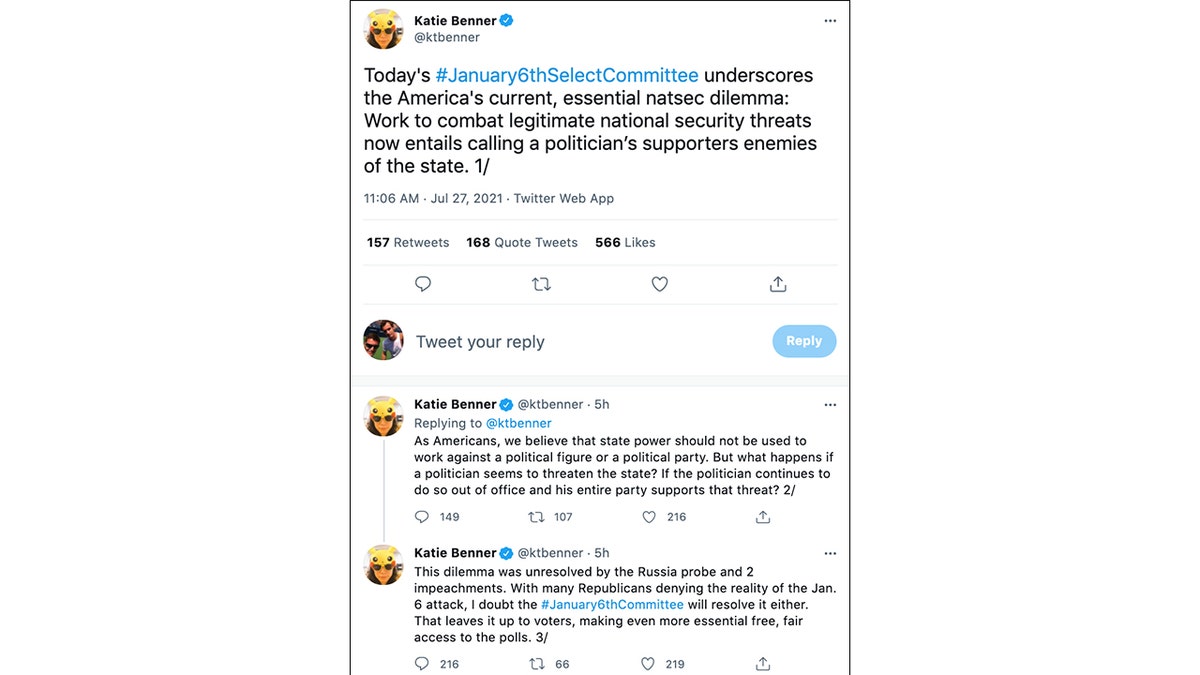Media top headlines July 30
In media news today, The Tampa Bay Times runs a 'hit piece' on DeSantis' press secretary, NPR gets mocked for a new policy allowing journalists to advocate for the 'freedom and dignity of human beings,' and NBCUniversal's CEO insists Tokyo Olympics will still be profitable despite massive viewership drop
It appears that The New York Times has shifted its enforcement of the paper's social media guidelines for its employees as the reporter who attacked millions of Trump voters has skated while a freelance editor was fired earlier this year after making a pro-Biden tweet.
The Times has been radio silent ever since its Justice Department reporter Katie Benner took to Twitter on Tuesday during the first hearing of the Democrat-led Jan. 6 select committee.
"Today's #January6thSelectCommittee underscores the America's current, essential natsec dilemma: Work to combat legitimate national security threats now entails calling a politician’s supporters enemies of the state," Benner wrote.
NEW YORK TIMES SILENT AFTER STAR REPORTER EQUATES TRUMP SUPPORTERS TO ‘ENEMIES OF THE STATE’
Benner explained, "As Americans, we believe that state power should not be used to work against a political figure or a political party. But what happens if a politician seems to threaten the state? If the politician continues to do so out of office and his entire party supports that threat?"
The Times' DOJ reporter cast doubt that the Pelosi-appointed committee would resolve the "dilemma" since it remained "unresolved" following the Russia investigation and both impeachments of President Trump.
"That leaves it up to voters, making even more essential free, fair access to the polls," Benner concluded.

(Twitter)
Benner, who was recently hired as an MSNBC contributor, sparked backlash on social media for her tweets targeting Trump supporters.
Hours later, Benner deleted the tweets, claiming they were "unclearly worded." She offered no apology.
While she may have taken down her remarks, they appear to have been in direct violation of the Times' editorial standards, which read, "In social media posts, our journalists must not express partisan opinions, promote political views, endorse candidates, make offensive comments or do anything else that undercuts The Times’s journalistic reputation."
"Our journalists should be especially mindful of appearing to take sides on issues that The Times is seeking to cover objectively," the guidelines explain.
Benner's tweets appear to brazenly violate the Times' guidance, including the "must not express partisan opinions," "promote political views" and "make offensive comments" clauses.
However, since her tweets were made and removed, Benner's work has continued uninterrupted, landing the byline on four stories, including one about how the Justice Department is ordering the Treasury Department to turn over former President Trump's taxes to Congress.
The Times did not respond to several inquiries submitted by Fox News, including whether or not Benner was ever reprimanded by the paper and whether it believes Benner violated the social media guidelines.
One person who apparently was in violation of the Times' policies was Lauren Wolfe, the freelance editor who was fired for tweeting out her excitement of the arrival of Joe Biden at Joint Base Andrews ahead of his inauguration.

A spokesperson for the Times said back in January that Wolfe wasn't fired over "a single tweet," appearing to back up reporting at the time that Wolfe was previously warned by her employer about her social media activity.
The tweet, which showed a screenshot of CNN's coverage of Biden's plane the day before his inauguration, was captioned, "Biden landing at Joint Base Andrews now. I have chills."
While Wolfe's tweet likely fell in the "express partisan opinions" and the "endorse candidates" no-nos in the Times' social media guidelines, it certainly did not violate the "make offensive comments" clause nearly as much as Benner's attack on Trump supporters.
CLICK HERE TO GET THE FOX NEWS APP
Unlike Benner, Wolfe was terminated by the Grey Lady and has since gone independent, launching her own newsletter on Substack appropriately titled "Chills."
To her credit, Wolfe owned up to her liberal politics, writing "I’m a biased journalist and I’m okay with that" in a piece she wrote earlier this month.
"I’ve always believed it is better to be open about my views on the issues I cover, which for a long time have been war and international human rights. And yes, I often do write with an agenda—with an eye toward creating change," Wolfe explained. "So yes, I am biased, and consciously so when it comes to certain subjects—especially when I’m reporting on criminality. But I don’t see that as a bad thing."









































